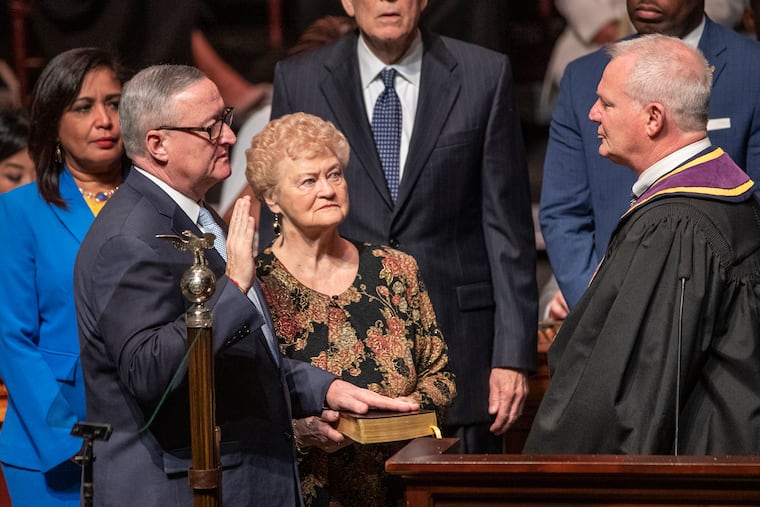The Mummers Parade will delay the next mayor’s inauguration
Mayoral transitions happen on the first Monday in January. The 2024 ceremony will be moved to Jan. 2 — but that doesn't mean the city will be without a mayor for a day.

Jim Kenney will no longer be the mayor of Philadelphia after 11:59 p.m. on New Year’s Eve.
The next mayor, however, won’t be publicly sworn in until about 36 hours later because City Council, which hosts the inauguration ceremony, has scheduled the event for Jan. 2 to avoid conflicting with the annual Mummers Parade.
Does that mean there will be no mayor during that period, opening the door to a possible coup d’état by the Mummers?
Alas, no.
The next mayor will officially take office at the moment Kenney is done, administration spokesperson Sarah Peterson said.
The Home Rule Charter, the city’s governing document, marks the transition between mayoral administrations as the first Monday in January. In 2024, that happens to coincide with New Year’s Day.
The swearing-in ceremony traditionally occurs in a special meeting of Council the morning after the outgoing mayor’s term ends. But this time around, Council has scheduled the event for a day later.
“The Mummer’s Parade and other New Year’s Day festivities require substantial crowd and traffic control services from public safety officers, and closing sections of Broad Street and surrounding streets,” said Joe Grace, a spokesperson for Council President Darrell L. Clarke.
Clarke consulted with the city Law Department, and City Solicitor Diana Cortes determined that “Council was well within its authority to schedule the first meeting of Council (the inauguration) for Tuesday, January 2nd,” Grace said.
(As it happens, Clarke is also leaving office after this year because he decided not to run for reelection. His successor, who will likely be Councilmember Kenyatta Johnson, will be officially elected at the same Jan. 2 Council meeting.)
Democrat Cherelle Parker, a former Council majority leader, will likely be the next mayor, unless Republican David Oh pulls off a shocking upset in the Nov. 7 general election. In a recent interview, Parker said that she hasn’t yet been involved with talks about the inauguration, but indicated she won’t be upset about Clarke’s decision.
“Right now, I am the proud Democratic nominee for mayor running in the general election and am not a part of that process,” Parker said. “It would be great if the inauguration was not competing with the Mummers Parade marching down Broad Street and all around City Hall.”
So if the next mayor can start serving before he or she is inaugurated, does that mean the swearing-in ceremony is purely symbolic?
Not exactly. The charter also requires elected officials to take an oath of office “before entering upon the duties of their office or employment.”
City law spells out the oath: “I do solemnly swear (or affirm) that I will support, obey and defend the Constitution of the United States and the Constitution of this Commonwealth and the Philadelphia Home Rule Charter and that I will discharge the duties of [the office] with fidelity.”
Typically, mayors don’t take the oath until the special Council meeting, meaning they hold the office but are not allowed to performs its duties or use its powers, such as making appointments or signing executive orders, for about 12 hours.
In the meantime, city departments continue to function with the leaders appointed by the previous administration.
The oath, however, does not have to be administered in a public ceremony. That means he or she can be sworn the minute the predecessor’s term ends so long as there is at least one witness while the new office-holder reads the oath.
That gives the next mayor some options: Take the oath in private at 12:01 a.m. Jan. 1, making the Jan. 2 ceremony purely symbolic; wait until the ceremony, allowing the city to operate in its status quo for 36 hours; or keep an eye on things and quickly take the oath if an emergency occurs and the incoming mayor needs to use the powers of the office on New Year’s Day.
In other words, the establishment of a Mummers junta is unlikely.
Correction: An earlier version of this article incorrectly stated the name of the city official who determined that the city had the authority to hold the inauguration on Jan. 2. City Solicitor Diana Cortes made that determination.